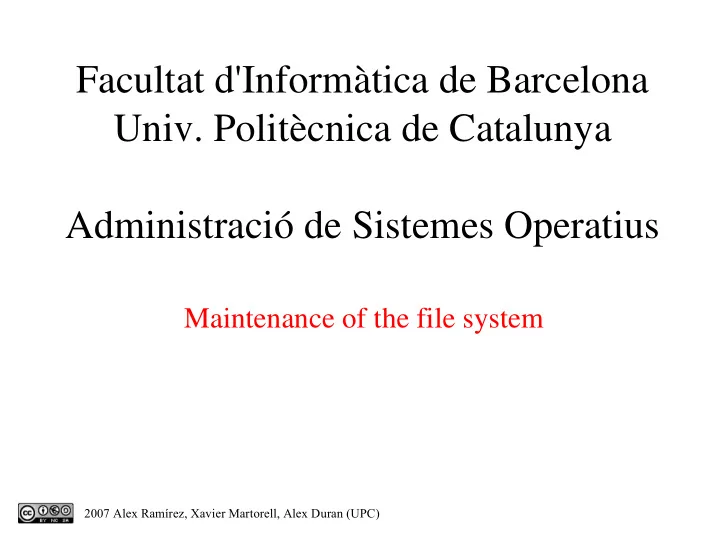

Facultat d'Informàtica de Barcelona Univ. Politècnica de Catalunya Administració de Sistemes Operatius Maintenance of the file system �����������������������������������������������������
Topics � 1. Introduction to OS administration � 2. Installation of the OS � 3. Users management � 4. Applications management � 5. System monitoring � 6. Maintenance of the file system � 7. Local services � 8. Network services � 9. Protection and security
Objectives � Knowledge � File systems � Backup tools � Backup support � Abilities � Increase the size of a file system � Verify a file system � Make and restore backups
Filesystems (I) � FAT (FAT16) --> DOS � Small disks (< 4GB) � Filenames 8+3 � FAT32 (VFAT) --> Win95 � Bigger disks � Long filenames � Direct links added � No owner nor permission control � NTFS --> WinNT, XP, Vista � Adds links and protections (creation, access, modifying...) � Windows NT security model
Filesystems (II) � ext2 � Linux filesystem � Soft/hard links � Access protection � Long filenames � ext3 � Adds journaling (eases error recovery) � reiserfs � Organizes files and directories as a database � Supports journaling � Particularly effective with small files � Does not suffer from internal fragmentation � ext4 � 64-bit addressing, improved journaling
Filesystems (III) � xfs � journaling � dynamic i-node management � ACLs � Huge maximum file size � FS activity log � jfs � journaling � dynamic i-node management � ACLs and MAC (Mandatory Acess Control) � Huge maximum file size
Filesystems incorporating journals � Journal : log all disk operations in disk � Easies FS recovery in case of a crash or error � Disk primitives can be slightly slower � The journal does not go through the buffer cache � The journal can be allocated in a different disk/partition � Ext3/4, reiserfs, JFS, XFS keep journal
Disk verification (I) � Sources of disk problems � Hardware errors � Power outages � Operating system errors � Administration errors � e.g., incorrect shutdown of the machine � Never verify a filesystem while mounted/without syncing � High risk of filesystem corruption � The verification process accesses the device directly through the driver instead of going through the buffer cache
Disk verification (II) � Logical verification � Filesystem metadades � Directory structure � Lost data recovery � lost+found directory � Physical verification � Disk blocks with I/O errors � badblocks command
Disk fragmentation � Faster access to consecutive blocks on the disk � Faster access to neighbour files on the disk � Faster access depends on disk area � middle vs. end
Extending the filesystem � Install and configure a new disk � Partition it � or recycle partitions in an old disk � Decide mount points � Create the filesystems � Transfer data to the new partitions � Mount partitions � Modify /etc/fstab � We may need to reorganize the directories � /home -> /homeA + /homeB � /home -> /home/students + /home/professors
Activity � Plan and define possible extensions to the following directories � /home � /usr/local � /var
Other maintenance tasks � Monitor � Free space (df) � Most filesystems reserve some space for root use (5%) � Used space (du) � Sync � Write all modified buffers to disk � sync � Update daemon
LVM � Logical Volume Manager � High level abstraction of the storage space � Groups multiple physical partitions � new devices can be added to the volumes � Allows to define logical partitions � they can have logical names � they can be redistributed over the physical partitions � resize � move
LVM /dev/hda2 /dev/hda3 /dev/hdb1 Physical Volumes (PV) Volume Group Logical Volumes (LV) home swap usr root (ext3) (reiserfs) (ext3)
LVM � /etc/fstab: ������������������������������� ����������������������������� �������������������������������� ����������������������������� �����������������������������
Backup copies � Which data should be copied? � User data (home, e-mail, ...) � Program data (DBs, CVS, SVN, git, web, ...) � System configuration � Binaries? � Frequency of copies � Level of volatility of the data � Data significance, how important they are � Backup types � Full backup (all data) � Incremental backup (only changes since last backup) � Reverse incremental backup (changes only)
Full backup � All data is always copied � Fast restore � Big size System backup t i m backup e backup
Incremental backup � Copy only files that have changed � From a certain date (last backup) � Slower to restore � Small size � First one is like a full backup � A long incremental chain complicates the restore process Sistema backup restore t i m backup e backup
Reverse incremental backup � All is compared, links are used to point to old data, and new copies are done for the changes � Fast restore � Small size � Only for random access devices (disks) = backup t i = m restore backup e backup
Backup copies (II) � Physical support � Floppy, disk, CD, tape, network... � We need to consider: � Availability � Cost/capacity � Usability � Fiabilitat � Speed � Where do we keep the backup copies? � Protected against accidents � Fireproof boxes � Keep some backups out of the organitzation � Protection against theft � Copy verification � Data compression � Space vs. security
Activity � Define a backup policy (directories to save, type, frequency, media, compression...) for: � A multiuser server for a company with: � 500 Gb. disk and 80 users � E-mail � 50Mb per user � Web pages � 20 Mb per user � 100 Mb corporative web � Code repository � 10 Gb distributed across 20 projects � Only 5 active projects
Other considerations � Multiple servers � User backup servers � more economic � easier to administrate � Tools: tar+rsync/ssh, amanda, bacula
Personal work � Task scheduling � Scripting languages: sh, perl � Commands for searching information: find, grep...
Recommend
More recommend